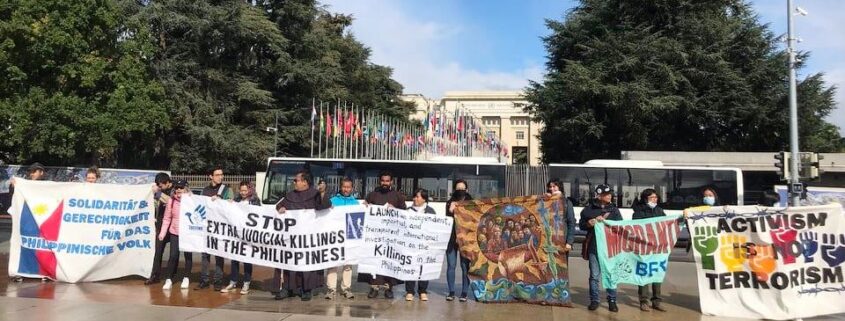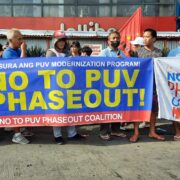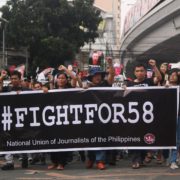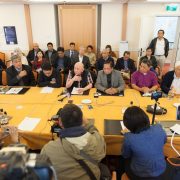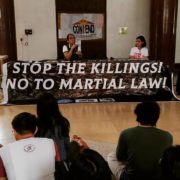PH among countries that persecute rights defenders—UN
Human rights defenders in the Philippines face reprisals and intimidation for cooperating with the United Nations (UN) on human rights, a new report reveals.
In an annual report presented Sunday, September 25, the office of the UN Secretary General Antonio Guterres said reprisals against human rights defenders may have even intensified despite the coronavirus pandemic.
“In March 2020, multiple statements were delivered by Government officials accusing civil society organizations engaging at the Human Rights Council of ‘masquerading as defenders of human rights,’ channelling ‘funding support … towards actors professing terrorism,’ and serving ‘hidden agendas of deceit and violence on the ground,’” the report says.
The report added that in June 2019, the UN Office of the High Commissioner for Human Rights (OHCHR) learned that a current member of the Philippine government-affiliated Committee on the Elimination of Discrimination against Women had reprimanded Philippine civil society present at a Council meeting.
The report also mentioned former Senator Leila de Lima, the group Karapatan Alliance for the Advancement of People’s Rights and its secretary general Cristina Palabay as among those who face reprisals from the government.
De Lima had been in jail for nearly six years for alleged drug trafficking but is considered as the Philippines’ most prominent political prisoner by a large portion of the international community.
Karapatan, the country’s biggest and most active human rights group, meanwhile suffer continuing red-tagging by the Philippine military, police and counter-insurgency groups.
Palabay has been slapped with criminal charges and arrest warrants the Philippine National Police (PNP) once tried to serve with arresting officers in disguise, a violation of its own procedures.
The UN said it has already called upon the Philippine government as early as June 2019 to cooperate with the OHCHR and the Council’s mechanisms, including restraining itself from intimidation or retaliation.
“The High Commissioner called on the Government to ensure that there were no reprisals for cooperation with OHCHR for her Council-mandated report,” it says.
The report covers May 1, 2021 to April 30, 2022.
Red-tagging as threat
The report’s first annex described the government’s red-tagging activities—labelling individuals and groups as communists or terrorists—as a persistent and powerful threat to civil society and freedom of expression.
It noted Philippine government’s response to UN’s concern by stressing the OHCHR’s data gathering and analysis methodology needs to be more transparent and should take into account so-called local political context.
The report said the Philippine government instead alleged that the “vibrant civil society in the country which is exploited by terrorist organizations purporting to be ‘human rights defenders,’ who are able to access funding to serve violent agendas in communities on the ground.”
It added that the Philippine government statement that it has no policy of censoring, interfering with, or monitoring the activities of independent human rights experts, human rights defenders, and civil society actors.
The UN however mentioned other forms of reprisals against human rights workers deemed critical of the Philippine government, such as the public stigmatization and calling for the resignation of the late Commission on Human Rights (CHR) Chairperson Chito Gascon.
The OHCHR also said it received information that the CHR continued to be the target of threats, intimidation and public questioning, given its engagement with the UN.
It also mentioned about the killing of at least two Karapatan members and the barrage of text messages to Palabay threatening death and rape from accounts of the PNP, the Armed Forces of the Philippines and the National Task Force to End Local Communist Armed Conflict.
“Despite positive developments, including pledges and shared commitments by Member States against reprisals, this report once again shows the extent to which people are pursued and persecuted for raising human rights concerns with the UN. And we know that, shocking though this number is, many cases of reprisals are not even reported,” Assistant Secretary-General for Human Rights Ilze Brands Kehris said.
“The risks affecting women victims, as well as women human rights defenders and peace builders, who share testimony and cooperate with the UN remain daunting. We will continue to work to ensure that all can safely engage with the UN,” Kehris stressed as she presented the report to the Council in Geneva.
Aside from the Philippines, the other 41 States referred to in the report are:
Afghanistan, Andorra, Bahrain, Bangladesh, Belarus, Brazil, Burundi, Cameroon, China, Cuba, Cyprus, Democratic Republic of the Congo, Djibouti, Egypt, Guatemala, India, Indonesia, the Islamic Republic of Iran, Israel, Kazakhstan, Laos People’s Democratic Republic, Libya, Maldives, Mali, Mexico, Morocco, Myanmar, Nicaragua, Russian Federation, Rwanda, Saudi Arabia, South Sudan, Sri Lanka, Sudan, State of Palestine, Thailand, Turkmenistan, United Arab Emirates, the Bolivarian Republic of Venezuela, Viet Nam, and Yemen. # (Raymund B. Villanueva)

